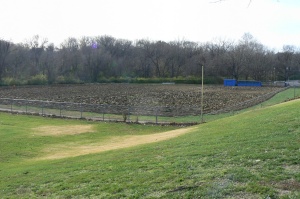How many champions does it take to grow a community garden? Of course it takes more than one focused passionate leader, but at Florissant Valley campus, Dr. Mark Manteuffel is a light to spark growth. He leads the community garden effort for not only his campus, but his project is the pilot to inspire the other campuses. A project of this magnitude and responsibility can better address cost and labor when it is infused into curriculum. Students lend their time, curiosity and solutions at each step.
Green Teams at each campus expressed desires to have a community garden, especially Meramec with its Horticulture program and Forest Park with its Hospitality program. One key obstacle for each team was where to place that garden and who would maintain it. When the district reduced athletic teams and a baseball field became obsolete, Florissant Valley faculty jumped on where their garden could be. With the help of the groundskeepers, the field was plowed twice and is resting for early spring when deep beds will be shaped. These beds, composed of organic soil, allow for easy deep root penetration for nutrients and require less watering.
Garden sustainability dimensions feature teaching about local food production as a lab, not just lecture. As food is grown locally, it has more nutrition. Crops are fresh without preservatives to maintain shelf-live while they take their long journey from a mega farm to the grocery store. The strategy to teach about organic farming allows for students and the community to learn about carbon-saving aspects as well as health benefits. The short trip to the store means less carbon emissions (fuel = carbon), a goal that Florissant Valley’s president, Dr. Marcia Pfeiffer, committed to reducing when she signed the ACUPCC (college presidents climate commitment).
I think one of the coolest parts of this project includes aquaculture. Two fish tanks were assembled with the help of engineering faculty and students. Fish waste is very nutritious. It will be used as part of the nutrients for the garden. Laura Stevens, Auxiliary Manager, is working with our kitchen composting efforts so that food scraps

- Aquaponic fishies arrive
can also feed the garden’s soil structure. Flo Valley students can look for a new collection system in the cafe’ allowing for student food scraps as well.
Jessica Sippy, Sociology faculty at Forest Park campus, has studied organic farming techniques at Earth Dance (Mueller Farm). She recently attended a conference for organic farming strategies. I hope to soon connect Jessica and Mark to share best practices with our college community. Next, my scheme is to include Rob Hertel in Hospitality at Forest Park and Paul Roberts in Horticulture at Meramec and Mark Weber at Wildwood who assists the Eco-Art festival. Each of these champions can lend creative directions for the garden. Garden Landscaping, Art sculptures and a teaching gazebo, and of course edible landscape.
“We planted 150 seeds to sprout! We got the fish in! We got the greenhouse rockin’!” said Mark after this last week’s efforts. We are at the genesis of this pilot. Inspiration abounds, but the design is surely in the details, and Mark needs our help. Weekly planning, planting and sharing are underway. If you are inspired to witness this project grow, you can contact Mark at mmanteuffel@stlcc.edu. Be a seed.


